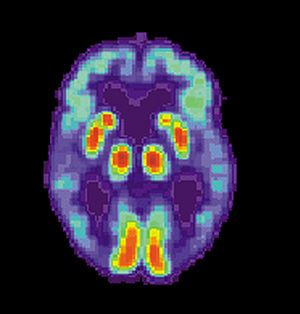
- Image via Wikipedia
In 2003, a group of scientists and executives from the National Institutes of Health, the Food and Drug Administration, the drug and medical-imaging industries, universities and nonprofit groups joined in a project that experts say had no precedent: a collaborative effort to find the biological markers that show the progression of Alzheimer’s disease in the human brain.
Now, the effort is bearing fruit with a wealth of recent scientific papers on the early diagnosis of Alzheimer’s using methods like PET scans and tests of spinal fluid. More than 100 studies are under way to test drugs that might slow or stop the disease.
And the collaboration is already serving as a model for similar efforts against Parkinson’s disease. A $40 million project to look for biomarkers for Parkinson’s, sponsored by the Michael J. Fox Foundation, plans to enroll 600 study subjects in the United States and Europe.
The work on Alzheimer’s “is the precedent,” said Holly Barkhymer, a spokeswoman for the foundation. “We’re really excited.”
The key to the Alzheimer’s project was an agreement as ambitious as its goal: not just to raise money, not just to do research on a vast scale, but also to share all the data, making every single finding public immediately, available to anyone with a computer anywhere in the world.
No one would own the data. No one could submit patent applications, though private companies would ultimately profit from any drugs or imaging tests developed as a result of the effort.
“It was unbelievable,” said Dr. John Q. Trojanowski, an Alzheimer’s researcher at the University of Pennsylvania. “It’s not science the way most of us have practiced it in our careers. But we all realized that we would never get biomarkers unless all of us parked our egos and intellectual-property noses outside the door and agreed that all of our data would be public immediately.”









